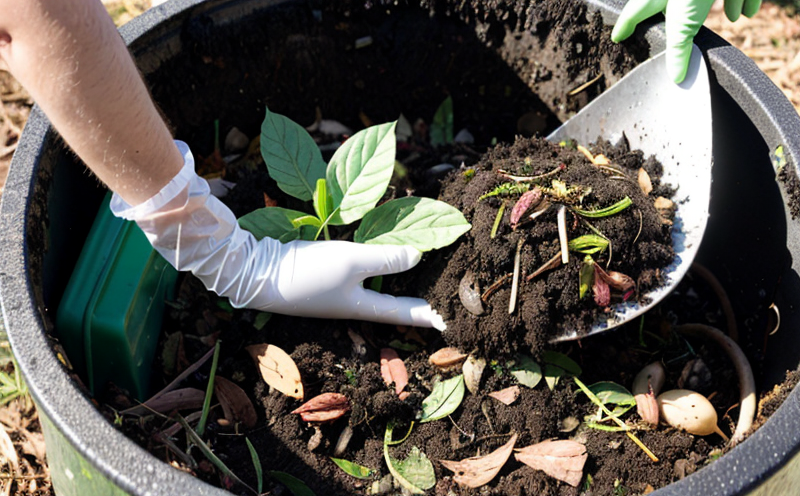FAO Pathogen Control Testing in Organic Waste Compost
The Food and Agriculture Organization (FAO) of the United Nations has provided guidelines to ensure that organic waste composting processes are safe for environmental release, consumer protection, and public health. This service focuses on ensuring that pathogenic microorganisms like Salmonella spp., E. coli, Listeria monocytogenes, and others are controlled during the composting process of organic waste. The objective is to produce a high-quality compost product with no risks associated with potential pathogens.
Composting organic waste is an environmentally friendly method for managing municipal solid waste (MSW). However, improper management can lead to the survival or even multiplication of pathogenic microorganisms, which could pose significant health hazards. Our FAO Pathogen Control Testing ensures that these risks are minimized by providing detailed and reliable testing data.
The process involves several stages where pathogens might survive or multiply. These include:
- Collection of organic waste from various sources such as residential, commercial, and industrial sectors
- Sorting and segregation of the waste into different streams (e.g., food scraps, garden waste)
- Initial treatment to break down organic matter into smaller particles
- Composting with controlled temperature, oxygen levels, and moisture content
- Maturity testing which includes pathogen control as one of its key criteria
The testing process itself is rigorous and involves multiple steps:
- Sample Collection: Samples are collected from various stages of the composting process. These samples can be taken at different temperatures, moisture levels, and oxygen concentrations.
- Preparation: The collected samples undergo a series of preparatory steps to ensure they are suitable for testing. This may include dilution, plating, or enrichment processes depending on the pathogen being tested.
- Identification: Using advanced microbiological methods and molecular techniques, we identify the presence of targeted pathogens in the compost.
- Data Analysis: The results from our tests are analyzed to ensure compliance with FAO guidelines and local regulations. This analysis provides a comprehensive report that includes details on pathogen reduction levels and overall quality of the compost.
The results of these tests play a crucial role in ensuring safe and sustainable waste management practices. They also provide valuable data for R&D engineers to optimize composting processes further, ensuring better outcomes. Compliance officers can use this information to ensure adherence to regulatory standards, while quality managers get insights into product performance.
Eurolab Advantages
At Eurolab, we offer a range of advantages that make us the preferred choice for FAO Pathogen Control Testing in Organic Waste Compost:
- Expertise and Experience: Our team consists of highly skilled professionals with extensive experience in microbiology and waste management.
- State-of-the-Art Facilities: We operate cutting-edge laboratories equipped with the latest technology to ensure precise and accurate results.
- Comprehensive Services: From initial sample collection advice to final reporting, we provide a comprehensive suite of services tailored to your needs.
- Regulatory Compliance: Our tests are conducted according to international standards such as ISO 11298 and FAO guidelines, ensuring that our results meet all relevant regulatory requirements.
- Rapid Turnaround Times: We understand the importance of timely results for your operations. Our efficient processes allow us to provide you with rapid turnaround times without compromising on quality.
- Customized Solutions: Every project is unique, and we offer customized solutions that meet your specific requirements.
Our commitment to excellence has earned us a reputation as one of the leading laboratories in this field. We are proud to serve clients across various sectors including municipal waste management, agricultural recycling, and environmental protection.
Why Choose This Test
- Potential Risks: Pathogens can survive or even multiply during the composting process. By testing for these pathogens early on, we mitigate potential health risks associated with using contaminated compost.
- Regulatory Compliance: Many countries have strict regulations regarding the release of organic waste compost into the environment. Ensuring compliance with these regulations is critical to avoid legal issues and maintain a good reputation.
- Environmental Impact: Proper pathogen control helps reduce the risk of environmental contamination, promoting sustainable and safe waste management practices.
- Risk Management: Early detection allows for corrective actions to be taken promptly, minimizing potential risks associated with contaminated compost.
In addition to these benefits, regular testing also provides valuable insights into the effectiveness of your composting process. This information can be used to optimize processes and improve overall quality.
Competitive Advantage and Market Impact
- Enhanced Reputation: By demonstrating commitment to pathogen control, you enhance your company's reputation as a leader in sustainable waste management practices.
- Increased Customer Trust: Consumers are becoming increasingly conscious of the environmental impact of their choices. Demonstrating compliance with FAO guidelines builds trust and loyalty among customers.
- Market Differentiation: In a competitive market, being able to provide certified pathogen-free compost can set you apart from your competitors.
- Regulatory Compliance: Ensuring regulatory compliance is not just about avoiding penalties; it also helps you stay ahead of the curve and anticipate future changes in legislation.
The demand for safe, high-quality compost is growing as more people recognize its benefits. By providing reliable FAO Pathogen Control Testing, you can meet this demand and contribute to a cleaner environment.





